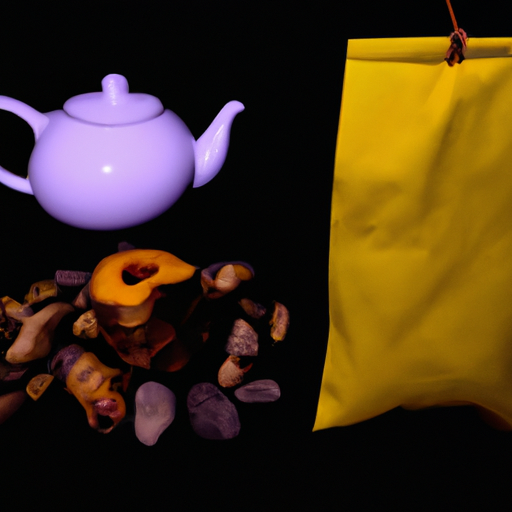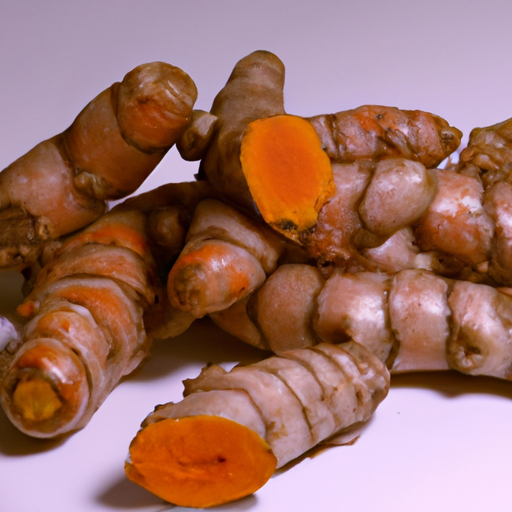As a fan of turmeric tea, I was intrigued by the possibility of it causing kidney stones. Kidney stones are a painful ailment that occurs when minerals and salts in the urine solidify and fuse together. Having suffered from kidney stones before, I understand the significance of being cautious about the consumption of certain foods and beverages that may lead to their formation.
Turmeric tea has gained popularity in recent years due to its many health benefits, including its anti-inflammatory properties. However, some people have raised concerns about the potential for turmeric tea to contribute to the formation of kidney stones.
In this article, I will explore the connection between turmeric tea and kidney stones and provide information to help you make informed decisions about incorporating turmeric tea into your diet.
Key Takeaways
- Turmeric tea has anti-inflammatory and antioxidant properties, and may have potential cancer-fighting abilities.
- Kidney stones are a painful condition caused by minerals and salts crystallizing in urine.
- Excessive consumption of turmeric tea can increase the risk of kidney stones due to the presence of oxalates.
- Prevention strategies for kidney stones include dietary modifications, limiting intake of high oxalate foods, and drinking plenty of fluids.
Overview of Turmeric Tea
Turmeric tea is a popular beverage that’s made by steeping turmeric in hot water, and it’s often consumed for its potential health benefits. Turmeric tea benefits include anti-inflammatory properties, antioxidants, and potential cancer-fighting abilities.
It has been used for centuries in Ayurvedic and Chinese medicine to treat various ailments, including digestive issues, arthritis, and skin problems. Brewing techniques for turmeric tea may vary, but the general process involves boiling water and adding turmeric powder or grated turmeric root.
Some people also add additional ingredients such as ginger, lemon, or honey for flavor. It’s important to note that turmeric stains easily, so it’s recommended to use a tea infuser or strainer to prevent staining.
Understanding kidney stones is crucial when consuming turmeric tea as it has been suggested that excessive consumption of turmeric can lead to the formation of kidney stones.
Understanding Kidney Stones
As a healthcare professional, I’ve encountered many patients with kidney stones. Understanding the formation and symptoms of kidney stones is crucial in managing this condition.
Risk factors such as dehydration, high salt intake, and certain medical conditions can increase the likelihood of developing kidney stones.
Formation and Symptoms
If you’re experiencing sharp pain in your back or lower abdomen, it could be a sign of kidney stones. Kidney stones are hard mineral deposits that form inside the kidneys and can cause severe pain when they pass through the urinary tract.
There are many kidney stone prevention strategies, including drinking plenty of water and avoiding certain foods that are high in oxalate, such as spinach and chocolate. Some people also turn to natural remedies, such as turmeric tea, to help prevent kidney stones.
Turmeric tea is a popular beverage that has been used for centuries in traditional medicine. It contains curcumin, which has anti-inflammatory and antioxidant properties that may help prevent kidney stones from forming. However, there is limited scientific evidence to support the use of turmeric tea for kidney stone prevention.
It’s important to speak with a healthcare professional before using any natural remedy, as some may interact with medications or have side effects. In the next section, we will discuss the risk factors associated with kidney stone formation.
Risk Factors
You may be at risk for developing these painful mineral deposits in your kidneys if you have a family history of them or if you have a diet high in certain substances. These substances include oxalate, calcium, and uric acid. Oxalate, in particular, is a key component in the formation of kidney stones. It is found in many foods, including spinach, rhubarb, and almonds. Additionally, high levels of calcium and uric acid in the urine can contribute to the formation of kidney stones.
Prevention strategies for kidney stones involve dietary modifications. It is recommended to drink plenty of water and limit intake of high oxalate foods. A table outlining high oxalate foods and their oxalate content is included below to assist in making dietary choices. In addition, limiting salt and animal protein intake may also be helpful in reducing the risk of kidney stone formation. By making these dietary changes, individuals can lower their risk of developing kidney stones and potentially avoid the pain and discomfort associated with them.
Moving on to the next section about ‘oxalate and kidney stones’, it is important to understand the relationship between oxalate consumption and the formation of kidney stones.
Oxalate and Kidney Stones
Avoid consuming too much turmeric tea, as it may increase your risk of developing kidney stones due to its high oxalate content. Oxalate is a naturally occurring substance found in many foods, including turmeric.
When consumed in high amounts, oxalate can bind with calcium in the body to form crystals that can lead to the formation of kidney stones. Therefore, individuals with a history of kidney stones or those who are at risk of developing them should be cautious with their turmeric tea intake and consider oxalate management, such as dietary restrictions.
It’s important to note that turmeric is not the only food that contains high levels of oxalate. Other common foods that are high in oxalate include spinach, rhubarb, and beets. However, by being mindful of our consumption of these high oxalate foods, we can lower our risk of developing kidney stones.
In the next section, we’ll explore the relationship between turmeric and oxalate in more detail.
Turmeric and Oxalate
As someone who’s interested in the effects of turmeric on kidney health, I’ve been researching the connection between turmeric and oxalate.
One key question that arises is how much oxalate does turmeric actually contain? Additionally, there’s concern about whether consuming turmeric can increase the risk of kidney stones due to its high oxalate content.
These are important considerations for anyone looking to incorporate turmeric into their diet for its potential health benefits.
How Much Oxalate Does Turmeric Contain?
Although turmeric is known to contain oxalates, research suggests that the levels are not significant enough to cause kidney stones.
Oxalate content in turmeric varies depending on the source of the spice and its preparation. One study found that the oxalate content in turmeric powder ranged from 1.87 to 10.44 mg per gram, with an average of 4.20 mg per gram.
Another study reported that the oxalate content in turmeric tea was 0.23 mg per 100 mL, which is considered low. The health effects of turmeric tea are generally favorable, with studies showing that it has antioxidant, anti-inflammatory, and anti-cancer properties.
However, individuals who are at risk of kidney stones or have a history of kidney stones may want to limit their intake of oxalate-containing foods, including turmeric. This leads us to the question of whether turmeric tea can increase the risk of kidney stones.
Can Turmeric Increase the Risk of Kidney Stones?
You’ve always wanted to try your hand at being a gemstone collector, but if you’re prone to urinary tract issues, be cautious when selecting items for your collection. Similarly, if you consume turmeric tea regularly, it’s important to consider its impact on kidney health.
Turmeric contains oxalates, which are naturally occurring substances that can form crystals and contribute to the development of kidney stones. To put things into perspective, here are three crucial things to keep in mind when it comes to turmeric consumption and urinary tract issues:
Firstly, excessive consumption of turmeric can lead to the production of oxalates in the body, which can ultimately increase the risk of kidney stones. Secondly, while turmeric has anti-inflammatory properties that can benefit the kidneys, it’s important to consume it in moderate amounts. Finally, if you have a history of kidney stones or other urinary tract issues, it’s advisable to consult a healthcare professional before incorporating turmeric tea into your diet.
In addition to turmeric, there are other foods high in oxalate that should be consumed in moderation. These foods include spinach, rhubarb, beets, nuts, chocolate, and tea. It’s important to maintain a balanced diet and avoid excessive consumption of oxalate-rich foods to prevent the formation of kidney stones and other urinary tract issues.
Other Foods High in Oxalate
Did you know that there are other foods high in oxalate besides turmeric tea that can increase your risk of kidney stones? As someone who’s concerned about oxalate restrictions due to kidney stone formation, it’s important to be aware of other foods that contain high levels of oxalate.
Some plant-based diets, for example, may contain high levels of oxalate, which can lead to calcium oxalate kidney stones. Some of the foods high in oxalate include spinach, rhubarb, beets, okra, almonds, cashews, peanuts, soy products, and chocolate.
It’s important to note that not all people who are at risk for kidney stones need to completely eliminate oxalate from their diet. However, it’s important to be mindful of the amount of oxalate consumed and to ensure adequate hydration to help prevent the formation of kidney stones.
With that said, let’s explore the role of hydration in kidney stone prevention.
The Role of Hydration
Staying hydrated is like a natural flush for your kidneys, helping to keep them healthy and free of potential problems. It’s important to consume enough water and electrolytes to maintain a proper balance of fluids in the body.
Electrolytes are essential minerals that help regulate many bodily functions, including the balance of fluids in the body. They include sodium, potassium, magnesium, and calcium, and can be found in many foods and beverages.
One way to increase your hydration levels is by drinking herbal tea. Not only does it provide water, but it also offers potential health benefits. Turmeric tea, in particular, has been shown to have anti-inflammatory properties.
However, it’s important to consume herbal tea in moderation and balance, as too much of any substance can have negative effects on the body. With this in mind, it’s important to consider the overall impact of our food and drink choices on our health.
Moderation and Balance
Finding moderation and balance in your food and drink choices is crucial for maintaining good health and preventing various health issues. It’s essential to consume a variety of foods in moderation to ensure that you’re getting the nutrients your body needs while avoiding excess intake of any single nutrient.
Similarly, it’s important to balance your fluid intake to prevent dehydration or overhydration, both of which can have adverse effects on your health. When it comes to consuming turmeric tea, moderation and balance are key.
While turmeric has many potential health benefits, including anti-inflammatory and antioxidant properties, excessive consumption can lead to adverse effects such as gastrointestinal issues and even kidney stones. Therefore, it’s important to consume turmeric tea in moderation and balance it with other fluids such as water and other herbal teas.
By finding the right balance, you can reap the benefits of turmeric tea without putting your health at risk. In managing kidney stones, it’s important to take a holistic approach that includes proper hydration, dietary changes, and medical treatment.
Managing Kidney Stones
When it comes to managing kidney stones, there are several treatment options available depending on the size and location of the stones. These can include medications, shock wave therapy, and surgical intervention.
Additionally, lifestyle changes such as increasing water intake and modifying dietary habits can also be effective in preventing future stone formation.
Treatment Options
To treat kidney stones caused by turmeric tea, you’ll need to break up the stones like a hammer breaking a rock.
One option for treatment is Extracorporeal Shock Wave Lithotripsy (ESWL), which uses sound waves to break up the stones into smaller pieces that can be passed through the urinary tract. This procedure is non-invasive and typically done on an outpatient basis.
Another option is ureteroscopy, which involves inserting a small scope through the urinary tract to locate and remove the stone. This may be necessary if the stone is too large to pass on its own or is causing significant pain.
Kidney stone prevention and dietary modifications are important in preventing future occurrences. It’s recommended to drink plenty of fluids, limit sodium intake, and avoid high oxalate foods such as spinach, rhubarb, and chocolate. Additionally, reducing intake of animal protein and maintaining a healthy weight can also help prevent kidney stones.
By making these lifestyle changes, the likelihood of developing kidney stones can be greatly reduced.
Lifestyle Changes
Now that we’ve discussed the different treatment options for kidney stones, let’s shift our focus to the lifestyle changes that can help prevent future occurrences. Healthy habits and dietary adjustments are essential in managing the risk of developing kidney stones.
Firstly, it’s important to stay hydrated by drinking plenty of water. Dehydration can lead to the formation of kidney stones.
Secondly, reducing sodium intake can also help prevent the formation of stones.
Lastly, incorporating calcium-rich foods in your diet can help prevent the formation of oxalate stones, which are the most common type of kidney stones. However, it’s important to note that excessive calcium intake can also contribute to stone formation. Therefore, it’s important to consult a healthcare professional to determine the appropriate calcium intake for your individual needs.
In order to prevent the recurrence of kidney stones, it’s crucial to adopt healthy habits and dietary adjustments. By following a balanced diet and staying hydrated, the risk of developing kidney stones can be significantly reduced.
In the following section, we’ll discuss alternative options for those who are looking for a substitute to turmeric tea.
Turmeric Tea Alternatives
You can try swapping out turmeric tea for other delicious and healthful alternatives like ginger tea or cinnamon tea. These herbs have similar anti-inflammatory properties and can also help improve digestion and boost the immune system. Ginger tea, in particular, has been shown to have potential anti-cancer properties and may help reduce symptoms of nausea and vomiting.
To help you make the switch, here is a table outlining the benefits of these herbal teas:
| Herbal Tea | Benefits |
|---|---|
| Ginger tea | Anti-inflammatory, potential anti-cancer properties, helps with nausea and vomiting |
| Cinnamon tea | Anti-inflammatory, helps regulate blood sugar, may improve brain function |
| Chamomile tea | Anti-inflammatory, may help with sleep and anxiety, promotes relaxation |
| Peppermint tea | Anti-inflammatory, helps relieve digestive issues, may boost energy |
| Hibiscus tea | High in antioxidants, helps lower blood pressure, may improve liver health |
By choosing these turmeric tea substitutes, you can still enjoy the health benefits of herbs without the potential risk of kidney stone formation. Incorporating a variety of herbal teas into your daily routine can also provide a tasty and easy way to support your overall health and well-being.
Frequently Asked Questions
Can turmeric tea be beneficial for kidney health in any way?
I have researched the potential kidney benefits of turmeric tea and found that it may improve kidney function and reduce inflammation. However, it is important to consult with a healthcare provider for appropriate dosage recommendations.
Are there any other health benefits of turmeric tea apart from its anti-inflammatory properties?
Turmeric tea benefits include potential anti-cancer, anti-diabetic, and anti-depressant effects. It may also improve brain function and reduce heart disease risk. Potential risks include interactions with certain medications. Alternative uses of turmeric in cooking are also available.
Does the preparation method of turmeric tea affect the oxalate content in the drink?
Prepare turmeric tea using caution, as the oxalate content can vary depending on the preparation method. Boiling or steeping for prolonged periods can increase oxalate levels. It is important to consider the potential health risks associated with high oxalate intake.
How does the oxalate content in turmeric tea compare to other beverages and foods that are high in oxalate?
In terms of oxalate content, turmeric tea falls in the middle compared to other high-oxalate beverages and foods. For those concerned about kidney stones, turmeric alternatives with lower oxalate content may be considered.
Can drinking turmeric tea in moderation still increase the risk of kidney stone formation?
Moderate consumption of turmeric tea with high oxalate content may increase the risk of kidney stone formation. However, this risk can be mitigated with adequate fluid intake and a balanced diet.
Conclusion
In conclusion, as someone who’s experienced kidney stones, I understand the importance of being cautious with the foods and drinks we consume. While turmeric offers numerous health benefits, it’s important to be aware of its oxalate content and potential to contribute to kidney stone formation.
However, this doesn’t mean we should completely avoid turmeric tea or other high oxalate foods. Moderation and balance are key, as well as staying hydrated and incorporating other kidney stone prevention measures into our daily routine.
As the saying goes, "an ounce of prevention is worth a pound of cure."Taking proactive steps to prevent kidney stones, such as watching our dietary choices and staying hydrated, can save us from the painful and costly experience of kidney stone removal.
And if we do experience kidney stones, seeking medical attention and following a treatment plan can help manage the condition and prevent future occurrences. In the end, it’s up to us to take responsibility for our health and make informed choices to protect our well-being.










